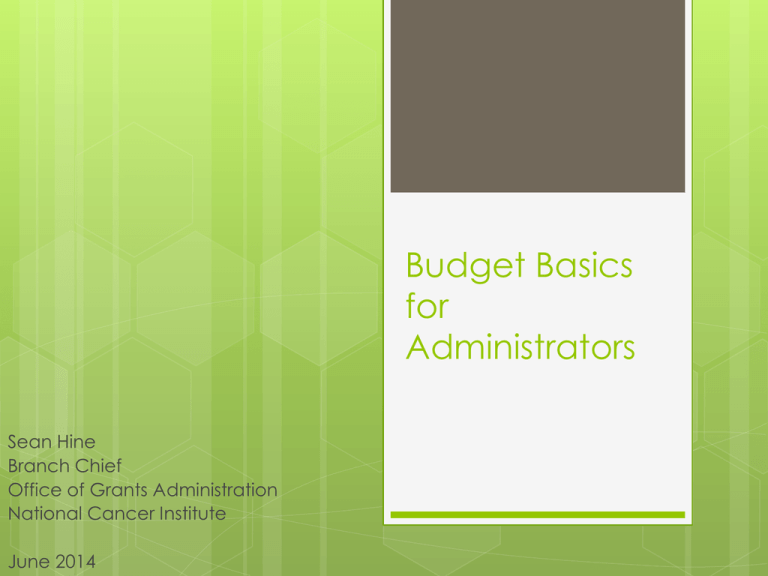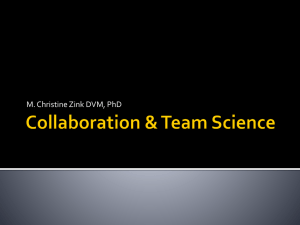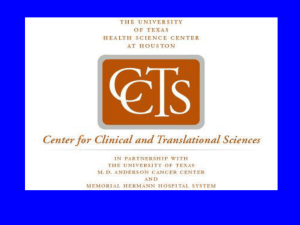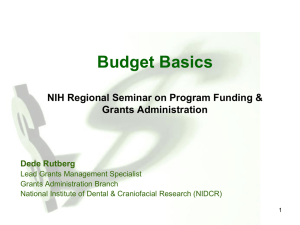Budget Basics for Administrators
advertisement

Budget Basics for Administrators Sean Hine Branch Chief Office of Grants Administration National Cancer Institute June 2014 What we will be discussing: Let’s discuss some logistics How do you start the request? Electronic submission Discussion of costs Overarching rules Types of budgets Dive into the nitty-gritty – budget specifics Pre-award considerations After the award We have an idea for a project…now what? All applications to the NIH must be in response to a Funding Opportunity Announcement (FOA) Be sure you understand the specifics of the FOA Including: period of support, type of budget(s), limits in $ levels, additional reporting, etc. Abide by any provided submission dates Welcome to the electronic world! NIH has completed the process of transitioning all competing applications to the electronic (SF 424) process This includes multi-project proposals More information at the following Guide Notice: http://grants.nih.gov/grants/guide/noticefiles/NOT-OD-13-075.html The requirements may change from mechanism to mechanism – be careful! All about costs A grantee is responsible for following and NIH for ensuring that all cost considerations are met Ensure your understanding of the applicable cost principles Particularly with the change to the uniform principles Grantees may shape their own systems as long as the principles are followed and the CFR standards are met for financial management systems Four tests for determining allowability: 1. 2. 3. 4. Reasonableness Allocability Consistency Conformance Costs (cont.) Differentiation between a Direct Costs and Facility & Administrative (indirect) Costs Directs – can be identified to a specific grant, project, etc. F&A – common or joint costs that cannot be readily identified with a specific grant More information including discussion on cost transfers, reimbursement of F&A, specific items of cost, etc. can be found at the following within the NIH Grants Policy Statement: http://grants.nih.gov/grants/policy/nihgps_20 13/nihgps_ch7.htm Costs (cont.) It is NIH’s responsibility as stewards of Federal funds to ensure that a grantee’s financial management systems are adequate to receive support and that all costs being requested within a proposal are allowable If we have any concerns, we will be in touch! Salary Cap Effective Jan. 12, 2014, the salary cap for Executive Level II has increased to $181,500 Guide Notice announcing the change: http://grants.nih.gov/grants/guide/noticefiles/NOT-OD-14-052.html This level also applies to consortia General Rules/Considerations Bona A Fide Need In any request, please be sure that the expenses you are including can be reasonably expected to be expended in the request time of support budget tells NIH what is needed in terms of $ for the proposed research. It is not used to assess the merit of that research; only accounted after the merit has been established General Rules/Considerations (cont.) Cost Sharing Not required Is assumed however when an expense is listed but there is no reimbursement requested (includes personnel contributing effort exceeding the level of salary support) Application requesting more than $500,000 Direct Costs (exclusive of consortia F&A) must seek permission from NIH at least six weeks prior to submission Understand the specifics of the FOA General Rules/Considerations (cont.) Well-funded investigators should discuss appropriateness and specific-Institute policies prior to submission Responsibility for the Fiscal Management of the award rests with the award recipient and listed principal investigator(s) Types of budgets Modular Categorical/Itemized Inclusion of consortia (modular & categorical) Program specific: SBIR/STTR Ruth L. Kirschstein National Research Service Awards – Fellowship & Training Research Career Development Awards Modular Budgets Availability of use is dependent on mechanism: R01, R03, R15, R21, R34 and others as identified on FOA Application and associated review process does not require a detailed (categorical) budget Capped at $250K direct costs per year (exclusive of consortium F&A costs) If you exceed $250K directs, you are moving to the categorical budget request If mechanism listed above, modular budget must be used if at or below $250K Modular Budgets (cont.) Grantee should begin with a categorical budget for all years to craft the “module” request Module = $25K direct costs General example: All five years of an R01 budget is $841,432. The average per year is $168,286. Modular budget request per year (rounding to next module) would be $175,000. No escalation per year Request may fluctuate if appropriate per FOA or one-time expense (i.e. equipment) but it should be justified Modular Budgets (cont.) Full justification on personnel Personnel should include names, person months and description of role Include other information as you deem appropriate to assist in clarification of request Consortia costs are calculated separately but same justification (personnel) requirements apply Modular Budgets (cont.) A few more things: If NIH needs further information, even a detailed budget explanation, we may ask for it The NIH Salary Cap should be accounted for in your calculation/estimate of the number of modules needed Be thorough in your personnel justification Time for the details – Categorical Budgets Personnel Indicate level of effort (calendar months) Provide institutional base salary up to the NIH salary cap If salary exceeds the cap, welcome to include a statement indicating as such in the justification Apply applicable fringe benefit for position Explain fluctuations in efforts! Equipment Generally, expected to be a one-time expense Be sure to comply with institution’s definition of equipment (NIH defines as $5K or more and an expected life exceeding one year) Categorical budgets (cont.) Travel Dependent upon the needs of the research but be sure it provides direct benefit to the project Must be consistent with institution’s own travel policies Comply with Fly America Act: http://grants.nih.gov/grants/policy/nihgps_2013 /nihgps_ch4.htm#fly_america_act Participant/Trainee Costs With exception of Training grants, this section should be left blank unless specifically identified within FOA Categorical budgets (cont.) Other Direct Costs Highly dependent upon the type of research being conducted – be realistic! Must be well justified – explain fluctuations and atypical expenses in the justification section Include tuition remission in this section Categorical budgets (cont.) F&A (indirect) costs Be sure to follow the rate agreement in place at the time of the application explicitly NIH will utilize whatever rate is in place at the time of award If the indirect cost base calculation is rather complicated, it may be beneficial to include a brief explanation in the justification Consortia Expenses Modular budget Categorical budget May exceed the $250K direct cost limit only for consortia F&A May round to the nearest $1,000 Beneficial to explain the direct cost need per year Personnel justification still required Detailed budget and justification similar to the parent grantee required Regardless, flow/pass-down rules are in effect! Some Classic Mistakes Did not request permission for submitting application greater than $500K directs Modular with multiple consortia without a clear idea as to how much is needed for each site – we need to reflect their costs including appropriate F&A too! Categorical budget does not justify fluctuations Application indicates that the grantee is going to take care of the PI’s salary BUT when the award hits, not so much… Some Classic Mistakes (cont.) The listed calendar months when applied to the base salary does not equate to requested salary Base salary exceeds current salary cap Calendar months in budget differs from justification Costs in budget differ from justification Indirect cost base calculation makes no sense given rate agreement and costs Reminder: If you are submitting an R01 and the request is: At or less than $250K each year, use a modular format Above $250K in ANY year OR a foreign (non-US) applicant, use a categorical format The $250K direct cost limit is exclusive of consortia F&A Special Programs The following programs have individual budgeting requirements: SBIR/STTRs NRSA Career (K) awards Be sure to comply with the specifics of the FOA and the listed budget requirements Pre-Award Costs Costs associated with a project that are incurred prior to the receiving of the NIH Award Allowable up to 90 days prior the start date of a competing award Remember – only the award is a guarantee of the Federal commitment Beyond 90 days requires prior approval Cost considerations still apply Incurred at the grantee’s own risk and expense – no requirement of the Federal government! You got the $!! Now what? When receiving the award, be sure to: Check that it was sent to the correct location Ensure the funds are available in payment management Understand the level of support - $ and time Account for any terms & conditions; keep an eye out for any special restrictions on funds Any restricted funds must be tracked by the grantee separately! After the award (cont.) Funds not matching what you asked for? Study section cuts have been applied Can discuss these with your awarding Institute/Center for reconsideration Funding policies have been put into place Not appealable and most likely being applied to all (i.e. you are not the only one!) If there may be necessary changes, be sure to discuss any potential changes in scope to the project with the awarding Institute/Center After the award (cont.) Build an internal budget utilizing the information provided in the award Again, be sure to track restricted funds separately Follow all regulations and policies If you are encountering start-up issues that may result in a large amount being unspent, have a pro-active discussion with your NIH staff We are here to help!! Last words… This is all of our Federal tax $ at work – we have a mutual obligation to take care of it wisely! There is a lot that goes into putting forward an application and conducting reviews – ask questions prior to help the process go smoothly For investigators, learn what a great resource your own sponsored programs office can be Resources NIH Grants Policy Statement (10/13): http://grants.nih.gov/grants/policy/nihgps_20 13/ SF424 (R&R) Application and Electronic Submission Information: https://grants.nih.gov/grants/funding/424/ NIH Modular Research Grant Applications: http://grants.nih.gov/grants/funding/modular /modular.htm Thank you!! QUESTIONS???


![NIH 101: Part 1 [.ppt]](http://s2.studylib.net/store/data/005398706_1-cbe361c448786ac362a8e75ad39fc05d-300x300.png)



